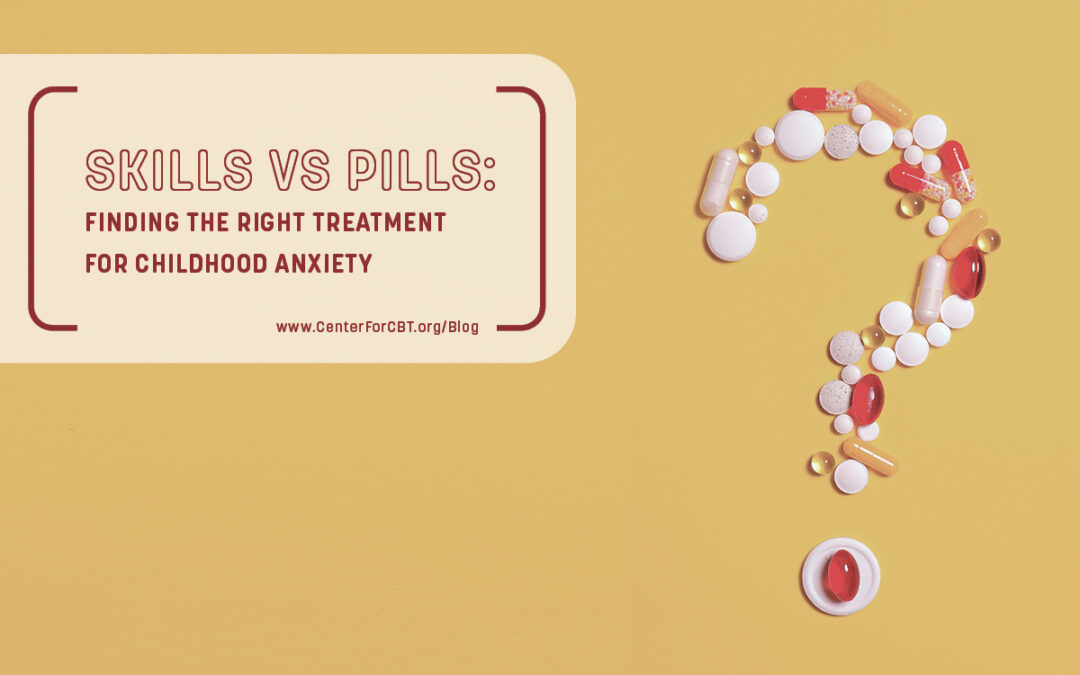Many families have difficulty finding the right treatment for their child or adolescent’s anxiety or other mental health challenges. Chances are, you have been experiencing that same struggle for yourself or a family member. You are faced with the choice of behavioral therapy or medication, and maybe even feeling some additional anxiety because of it. The uncertainty in how to approach treatment can be an inhibitor in and of itself, for fear of making the wrong decision. Finding treatment might feel like another hurdle in a long line of emotional roadblocks, and with so many variables to consider, treatment is a difficult path to navigate.
You may feel a lot of pressure to make the “right” decision, but there is no one size fits all. Treatment plans look unique for each individual, and finding what works for you or your child requires the guidance of a psychologist or psychiatrist who you feel comfortable working with and who employs evidence-based treatments. The right doctor will be able to offer you information on research-supported practices and help tailor treatment to the needs of you, your child, and your family in response to the different challenges that life presents.
With so many options and variability in treatment, it can be difficult to figure out where to start. There are several factors to consider. So as you start your search for the right treatment, there are a few key questions to ask yourself:
What are you seeking treatment for?
The first thing to consider are the primary concerns prompting you to seek treatment. Are there temporary challenges that your child needs some additional support to overcome? Or is this a long-term, chronic issue? Certain conditions may be best treated with medication, while others can be significantly improved by therapy. When it comes to anxiety, the AACAP Anxiety Practice Parameters suggests that those with mild to moderate anxiety should start out with therapy and make adjustments to treatment as appropriate. However if your child is coping with more severe levels of anxiety, they may have trouble practicing and applying the skills taught in therapy, which can make behavioral treatment less effective. In that case, it may make sense to start off with medication, or a combination of medication and therapy.
Are you and your child motivated for treatment?
Whether you are considering the route of medication or behavioral therapy, your child’s willingness to start treatment plays a large role in their experience. A positive outlook can make for a more positive treatment, so you want your child to be open to the experience and prepared for the changes that come with it. If they are totally opposed to the idea, then maybe now is not the best time to start. It may be difficult to understand your child’s anxiety, but it is important not to force them into treatment if they are not ready, even though you are trying to help. Leave the option open to them, and give them time and space to consider it. Likewise, you want to make sure your family is on the same page about treatment too. Dissonance between parents or other important adults in your child’s life can create a stressful experience for everyone and can impede progress in treatment. It is important that those involved in the decision making are willing and ready as well.
Starting treatment is the first step, but equally important is following through with treatment. Behavioral therapy requires mental fortitude, and to get the most out of the experience both you and your child should be prepared to practice skills outside of sessions. Even if you attend regular weekly meetings with your doctor, it is important to continue to exercise that mindset in day-to-day life for your greatest benefit. On the other hand, if you are pursuing the route of medication there are some initial side effects to consider. It can also take time to find the right medication and adjust it to the proper dosage. Either option requires commitment and follow through to get the most out of treatment.
What resources do you have available?
Even if you and your child feel ready to start treatment, there can be some realistic challenges that factor into your decision making. These may include:
-
- Time and effort. In addition to the effort required to follow through with treatment, it can be an extensive process to get started. There is a lot to research and consider— finding a local provider who offers the right treatment, considering insurance and out-of-network treatment options, and searching for someone you feel comfortable working with. This can be time intensive as well as mentally and emotionally taxing. Those feelings may be compounded if there are additional personal or familial challenges occurring.
-
- Transportation. It can be hard to find a provider who “checks all the boxes,” and sometimes that means your best match is over an hour away. In the case of behavioral therapy, it is something many families work to accommodate, but driving the distance could be too much for some. Consider the type of treatment that you will be seeking, and see if it allows for virtual or hybrid sessions. This format may be appropriate in some situations, but not all, so discuss the option with providers you are considering to see what they recommend.
-
- Finances. Treatment of any kind is a financial investment, whether it be for weekly therapy sessions or monthly medication refills. It can be difficult to navigate insurance coverage and out of network benefits to meet your bottom line. And unfortunately, good treatment tends to come at a higher cost. The reality of finances can be a major factor in determining who you will work with for treatment.
How much of a commitment can you make?
Behavioral therapy and medication require different levels of commitment in terms of time and effort. When it comes to therapy, it takes weeks of consistent sessions and skill building to be able to apply the teachings to daily life. Consistency in treatment and long-term commitment are key, and will yield a more beneficial experience. Even though this is a long-term time investment, the goal is to build your child’s confidence in their skills so that they can live a more fulfilling life even after treatment has concluded. Once the time has been taken to build and develop skills, you and your child are equipped with teachings that can last a lifetime. They are something you can always reflect upon and practice, with the help of a few booster sessions as needed.
If you are pursuing medication, there may be less of a time investment upfront. When you are prescribed the right medication, a pill will do what it is intended to do, without requiring the same sort of consistent mental effort that therapy does. However, there is a different sort of commitment required when it comes to medication. Things may feel stagnant for a period of time, or as though they are getting more difficult before they become easier. This is because it can take time to determine the right medicine and appropriate dosage and this period of adjustment often comes with physical and emotional side effects. These experiences are variable and will not affect everyone in the same way, so speak with your doctor to learn about the impacts of starting medication. In spite of the challenges medication may seem to present, always follow the guidance of your psychiatrist to achieve a happier, healthier mental state.
Takeaway Points
Many children who need treatment are not getting it, and even when they are, it may not be the right one. It can be difficult to decide between therapy or medication, but you may not need to. Often, a combination of both can be most effective. The child/adolescent multimodal study on anxiety (CAMS) assessed the effectiveness of different treatment approaches for anxiety in children and adolescents. It found that those who received a singular treatment of either medication or behavioral therapy showed improved results when compared to those who did not receive treatment of any type. The study also assessed the impact of medication in conjunction with therapy, and found that this combination was even more effective than when the treatments were received independently.
Taking pills is not just an easy way out, and going to therapy is not a sign of weakness. There is so much variability in the types of challenges we face, and even more still in how any given person will respond to treatment. Every situation is unique, so you need to consider what will work best for your child and your family in consultation with a trusted doctor, whether that means therapy, medication, or a combination of the two. Treatment is an evolutionary process, and your doctor should adjust it to meet current needs as they develop throughout your child’s life.
If you are considering any sort of treatment for anxiety or other challenges, the key to overcoming those struggles is finding the right doctor or team of providers who can keep you informed about your options and help guide you in the process.
Note: This article is intended for informational purposes only. It should not be taken as medical advice. All medical and mental health decisions should be made in consultation with a qualified professional.



